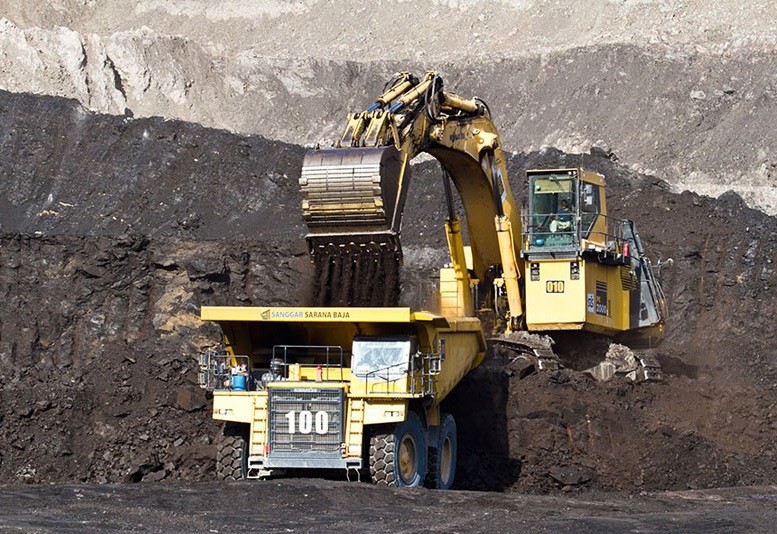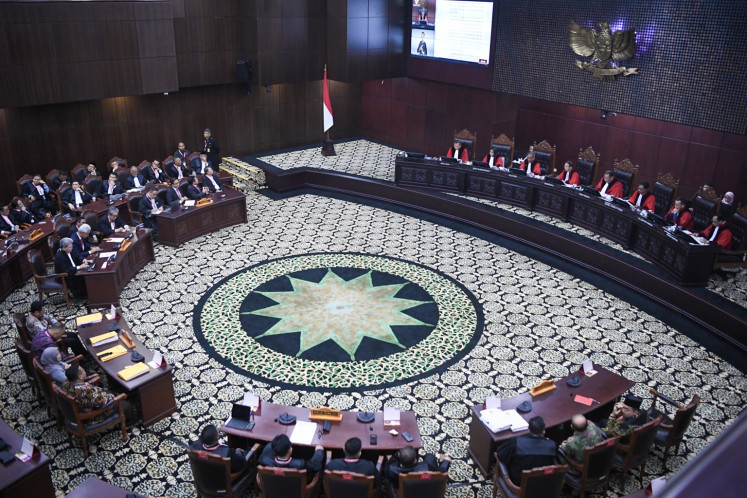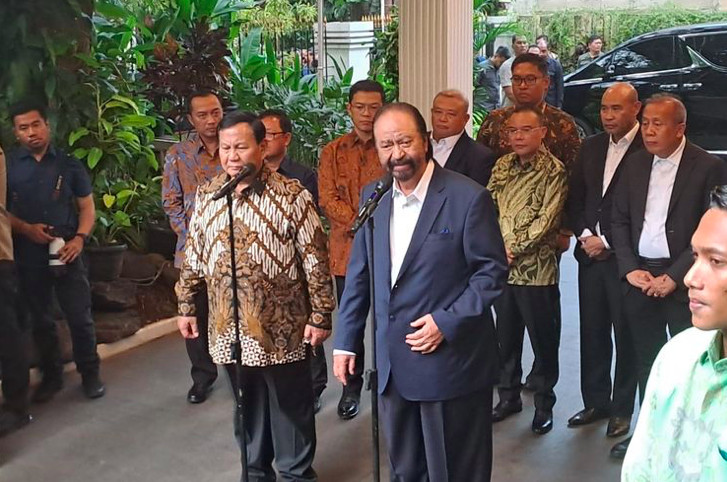VAT dispute with coal producers affects investment
Coal producers claim they still have more than Rp 1.5 trillion ($110 million) in VAT refunds that have yet to be settled by DGT.
Change Size
 A backhoe loads tons of coal to a heavy-duty truck at Adaro Energy's site in Kalimantan. The company is planning to expand into green-energy business starting this year through its subsidiary Adaro Power. (Courtesy of http://www.adaro.com//-)
A backhoe loads tons of coal to a heavy-duty truck at Adaro Energy's site in Kalimantan. The company is planning to expand into green-energy business starting this year through its subsidiary Adaro Power. (Courtesy of http://www.adaro.com//-)
H
igh tax burdens associated with preparing, filing and paying taxes and with the post-filing process that involves tax audits, tax refunds and tax appeals have been a major factor that has made Indonesia’s rank in the World Bank’s annual ease of doing business survey consistently low, even the lowest in the ASEAN region.
The 2015 World Bank’s ease of doing business index has put Indonesia 114th out of the 189 countries surveyed.
One of the most blatant examples within the post-filing process seems to be the inefficient and even inconsistent treatment of the value added tax (VAT) on coal caused by differing interpretations of the laws and regulations, and different analyses of the process of coal mining and processing.
VAT is essentially a tax that is charged on a broad range of transactions with a tax deduction mechanism allowing businesses to offset VAT paid on inputs against VAT paid on outputs.
Each taxable business pays VAT to its providers on its inputs and receives VAT from its customers on its outputs. Input VAT incurred by each business is offset against output VAT.
David Hamzah Damian, a partner at the Tax Compliance and Litigation Services of Danny Darussalam Tax Center, confirmed that the Directorate General of Taxes (DGT) had issued several contradictory ruling letters regarding the VAT on coal.
DGT itself has also acknowledged there have been different interpretations on and treatment of the VAT mechanism by tax officials and judges at the tax court, especially as regards the third-generation coal mining contracts awarded between 1997 and 2000.
But DGT did nothing and decided instead to wait for the outcome of the renegotiations of the coal mining contracts with the Energy and Mineral Resources Ministry.
The government apparently wanted to amend all coal mining contracts to adjust them to the 2009 Mining Law and to make all coal mining firms subject to prevailing laws (not lex specialis).
Simply waiting for a solution to the dispute over the VAT mechanism between coal miners and DGT as part of the overall contract negotiations could adversely affect the production of coal, which still plays a crucial role in power generation.
Hamzah explained that different from the second-generation contracts, which are subject to prevailing laws, third-generation coal mining contracts stipulate provisions specifically nailed down to the 1994 VAT Law.
Hence, the contract is legally regarded as lex specialis, not subject to laws and regulations enacted after the contract signing until the contract expires.
The 1994 VAT Law specifically stipulates that crude oil, natural gas, and gravel and other directly extracted natural resource commodities are non-taxable goods within the VAT mechanism.
But the law does not explicitly include coal in the category of mining products that are non-VAT taxable.
But we also know that coal is produced in several qualities, depending on the value-added processes the mineral undergoes (such as washing or upgrading).
The different qualities represent the different grades of coal sold in the market.
But problems arose after the government issued a regulation ( PP 144 ) in 2000 explicitly stating that coal is not taxable within the VAT system, thereby contradicting the 1994 VAT Law.
In 2008, six giant coal companies refused to pay outstanding coal royalties totaling US$598 million to the government, claiming that the government still owed them the same mount in unpaid VAT refunds. But the companies, which at that time still enjoyed high coal prices, eventually yielded to government pressure.
Instead of waiting for the results of contract renegotiations that could take more several years to conclude, many coal companies lodged their VAT dispute cases at the Tax Court.
Coal producers claim they still have more than Rp 1.5 trillion ($110 million) in VAT refunds that have yet to be settled by DGT.
Hamzah acknowledged that within the short term, tax dispute resolution through the Tax Court seemed to the best legal avenue. The problem though is that the Tax Court itself has been inconsistent in its rulings, again due to the different interpretations of the laws and rules and different analyses of coal production processes.
The Supreme Audit Agency (BPK) concluded in its 2014 audit of the DGT that the DGT regional offices had been discriminatory or inconsistent in their treatment of input VAT refunds for coal companies.
BPK discovered that in 2014, DGT approved Rp 1.66 trillion ($123 million) in input VAT restitutions for 11 coal companies, but rejected similar VAT claims for refunds from many other coal companies of the third generation.
Judges at the Tax Court often had differing views about the stages of value-adding chain in coal production. A panel of judges who understand the value-adding coal processing chain usually consider upgraded coal to be taxable commodity.
Strange, though, even though DGT has ruled that coal is no longer taxable under the VAT mechanism, coal companies remain subject to the regulation obliging them to collect VAT from the coal they sell under their domestic market obligation.
This certainly caused double blows to coal producers because they cannot get VAT refunds for their production inputs, but they still have to collect the 10 percent VAT on coal they sell to domestic buyers, thereby making their coal prices higher than those of other producers who can claim VAT refunds.
***
The writer is senior editor at The Jakarta Post.
---------------
We are looking for information, opinions, and in-depth analysis from experts or scholars in a variety of fields. We choose articles based on facts or opinions about general news, as well as quality analysis and commentary about Indonesia or international events. Send your piece to community@jakpost.com.









